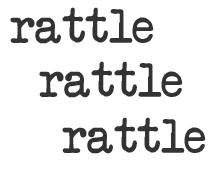I confess I haven't read anybody's responses in any detail yet. I guess the interaction part'll have to come later. Also, might I suggest Bloglines for anybody who doesn't want to check everybody's blog everyday? Handy.
In response to the in-class discussion of whether Shelley is--and I forget the words people were using to describe him--elitist: um, yeah? It runs with the poetic (naturally exclusive?) territory? (I posed those as questions because--?)
What rubs people the wrong way most, I think, is his complete confidence in poetry (see "Poetry is the record of the best and happiest moments of the happiest and best minds" & "These [traces of diviner nature] and corresponding conditions of being are experienced principally by those of the most delicate sensibility and the most enlarged imagination; and the state of mind produced by them is at war with every base desire."). Shelley's conception of poetry differs from our own in terms of what poetry can do.
Personally, I'm not so convinced that a particularly striking line of poetry is that which best channels divine design; I'm not so convinced that poets are the "unacknowledged legislators of the world" in the modern world, where poetry is, to most non-poetic folks, fluffy, stuffy, or fruitless. The difference may be cultural, though Shelley no doubt sounded the fluffy idealist to a number of early-19th century contemporaries. It's not entirely fair to knock Shelley on the grounds of being rabidly pro-poetry; his optimistic faith in the form--particularly metrical--to actually accomplish philosophically heroic deeds outside of an exclusive poetic community is, well, admirable. I wish I could believe my poetry would have a tangible effect on the world (or at least on Western culture, as Shelley no doubt means).
This was a little less organized than I would've liked. In reading the "Defence," I kept thinking of the different ways to examine it--and I'm sure, upon reading all y'all's responses, I'll see more that didn't occur to me--but he addresses a number of important points regarding the poet, poetic form, and poetry's role/importance within society--more ideal than actual, really. Here's hoping some folks scratched deeper than I did.
Subscribe to:
Post Comments (Atom)

5 comments:
This is great, Willie. You and a couple other people hit on the same problem: Shelley's time and ours are worlds apart in terms of the degree of credibility we afford to the concept of poets having any kind of vital relation to the larger sphere of social conduct and values.
You bring up a good point. Poets and legislators, one in the same? Highly doubtable. There is a definite time gap between this work and our contemporary ideas on poetry. But as I said in response to someone else's post, there is nothing wrong with being an elitist. We as poets are a minority and should be allowed a certain level of pride.
I guess I should make it clear that exclusivity's unavoidable, not encouraged. Poets should seek to be outcasts, not elitists!
Oh ho ho.
Willie,
Donald Davie has an interesting perspective (not in the book I excerpted in the reader, but somewhere else) that I think might relate to your comment here. He would say that your desire to be an outcast rather than an elitist points ultimately to a fascist impulse--that instead of taking full advantage of the privileges afforded to you by the liberal democratic ideology of free expression and so forth, you have a repressed wish to be held accountable by the system, to be punished for your expression. Whereas, if you embrace a more elitist stance, you are asserting your right to determine your own private values and shape your immediate social network accordingly, without concern for the attitudes of the dominant system. Fascist. ;)
But seriously, I do think there's something to the idea that "seeking to be" an outcast works in some way to reinforce the values that would make you an outcast in the first place. As opposed to just realizing that an outcast status is an inevitable result of certain activities, and working from within that status to maintain what power you have and build larger social and textual alliances with other, sympathetic persons.
Ha! Serves me right for being dismissive in my response, aye? =D
Post a Comment